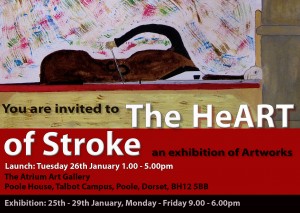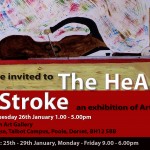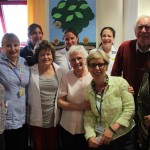
The artworks of stroke patients involved in a study to explore whether creative art can be used to increase confidence following a stroke will be on display at Bournemouth University (BU) throughout this week.
Depression is commonly experienced by stroke patients and the HeART of Stroke project was developed to find out if creative expression could improve the confidence and wellbeing of stroke survivors. Bournemouth University’s Dr Caroline Ellis-Hill led on the project, which was a collaboration between BU, the Royal Bournemouth and Christchurch Hospitals NHS Foundation Trust, University of East Anglia and Cambridgeshire Community Services.
The study was funded by the National Institute for Health Research (NIHR) Research for Patient Benefit (RfPB) programme as a feasibility project to look at the role of art based interventions in health care. Over the course of 14 weeks, people who had previously been treated at the Royal Bournemouth Hospital attended 10 creative workshops, facilitated by artists. Throughout the sessions, participants were encouraged to create their own piece of artwork as a means of exploring how their lives had changed as a consequence of their stroke and to develop a more outward facing view on life.
Marjorie Legg, who had a stroke not long after her husband passed away, took part in the study as she found that the stroke had affected both her mood and confidence. Commenting on her experiences, Marjorie said, “The stroke had stripped me of all confidence. I didn’t want to go out and do anything.
“I was a bit nervous about taking part in the workshops at first – I’d never been arty or drawn anything before in my life, but the workshops were fantastic and really built up my confidence. I now go on coach trips to see new places and have even enrolled in an local art class. The study has shown me there is life after stroke.”
Lead researcher, Dr Caroline-Ellis Hill said, “We are really encouraged by the results of the study and hope that it will lead to more in-depth research exploring the benefits of creative art for people following a stroke .
It is easy to lose a sense of self after a stroke and normal life can feel very strange, leading to a loss of confidence. We hope that further studies can be carried out to demonstrate the positive effects of Art and Health groups following a stroke , with the ultimate aim of seeing this kind of support available as a post-stroke intervention through our health and care systems.”
The exhibition will be on display in the Atrium Art Gallery between 9am and 6pm, 25 – 29 January, with members of the research team on hand to share more about their project.
 HeART of Stroke Exhibtion, Atrium Art Gallery: 25th – 29th January
HeART of Stroke Exhibtion, Atrium Art Gallery: 25th – 29th January Research in the news: ‘Making a difference in stroke care: the human aspects of care and practice’
Research in the news: ‘Making a difference in stroke care: the human aspects of care and practice’










 REF Code of Practice consultation is open!
REF Code of Practice consultation is open! BU Leads AI-Driven Work Package in EU Horizon SUSHEAS Project
BU Leads AI-Driven Work Package in EU Horizon SUSHEAS Project Evidence Synthesis Centre open at Kathmandu University
Evidence Synthesis Centre open at Kathmandu University Expand Your Impact: Collaboration and Networking Workshops for Researchers
Expand Your Impact: Collaboration and Networking Workshops for Researchers ECR Funding Open Call: Research Culture & Community Grant – Apply now
ECR Funding Open Call: Research Culture & Community Grant – Apply now ECR Funding Open Call: Research Culture & Community Grant – Application Deadline Friday 12 December
ECR Funding Open Call: Research Culture & Community Grant – Application Deadline Friday 12 December MSCA Postdoctoral Fellowships 2025 Call
MSCA Postdoctoral Fellowships 2025 Call ERC Advanced Grant 2025 Webinar
ERC Advanced Grant 2025 Webinar Update on UKRO services
Update on UKRO services European research project exploring use of ‘virtual twins’ to better manage metabolic associated fatty liver disease
European research project exploring use of ‘virtual twins’ to better manage metabolic associated fatty liver disease